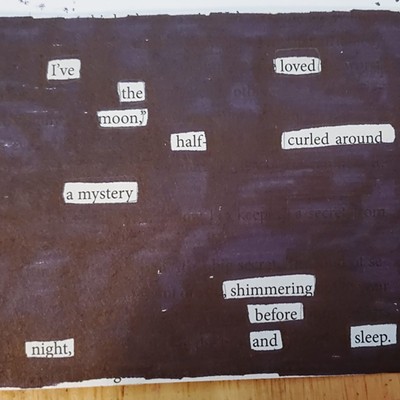[
{
"name": "500x250 Ad",
"insertPoint": "5",
"component": "15667920",
"parentWrapperClass": "",
"requiredCountToDisplay": "1"
}
]
Being a Democrat in rural America, even in a deep blue state like New York, isn't always easy.
The nation's rural outposts have never been completely hospitable to the type of progressive, liberal agendas that thrive in urban areas --- for a whole host of reasons, reasons whose roots stretch back to pre-Revolutionary days. Instead they've often harbored an independent, anti-establishment streak.
In some parts of the country, that ethos is celebrated. And on the national level conservative image managers, armed with little more than some down-home window-dressing, have proven its resurgent appeal. For an example, look no further than the current occupant of the White House. A little twang goes a long way.
But for that rare subset of rural progressives in a progressive urban state, there's neither the solace of the conservatives' oppositional brand of rural identity politics, nor any real clout in their own ruling party.
Out of the nearly 5.5 million registered Democrats in New York, considerably fewer than a million hail from rural counties. If you don't count smaller cities like Binghamton, Utica, and Elmira or those of the mid Hudson Valley, the number shrinks to nearly half a million. Even in a tight primary, statewide Democratic candidates would be better off sticking to downstate in their campaigns, where they'd able to court that many voters in any single borough of New York City (except Staten Island).
That simple math has meant that urban and downstate interests have all butdominated politics in New York --- and especially in the state's Democratic Party.
Over a decade ago, frustration with that power dynamic culminated in the creation of the Democratic Rural Conference. Party activists from about two-thirds of the state's most rural counties banded together to form a forum where their voices would be heard. And they've found an effective way to do it: by holding their statewide convention --- and an accompanying straw poll for statewide races --- early in the year. That gives the poll a New Hampshire Primary-like leverage in attracting the attention of urban and suburban Democrats.
The straw poll may not mean much (its record of predicting ultimate winners is mixed, at best), but it marks a turning point in the campaign season. It's a coming-out party of sorts, a chance for candidates to test their slogans and prove themselves to potential donors. It's too bad New York's Republicans don't have a similar early-season event. (You could argue that the Conservative Party's convention, which also features statewide candidates laying out their positions, qualifies, but it differs from the DRC straw poll since what happens there actually has a significant impact on GOP candidacies.)
The big draw at this year's Democratic Rural Conference convention in Ithaca March 3 and 4 was the match-up of Eliot Spitzer and Tom Suozzi. Spitzer, now the state's attorney general, has made a name for himself nationally as the "sheriff of Wall Street" and up until recently was expected to march unimpeded into the governor's mansion. The DRC's poll --- just a week after Nassau County Executive Suozzi defied virtually every party leader and jumped into the race --- was the first time the two were pitted against each other. If the result means anything (and Suozzi's team says it doesn't), things are looking good for Spitzer. He got 148 votes, while his upstart challenger fielded just seven.
But that doesn't mean the event hurts Suozzi, who got a chance to make a pitch to some of the voters he'll be relying on, all the while maintaining his status as a party outsider. In a measure of how much of an outsider he was, Suozzi was nominated by the DRC's secretary, who qualified his nomination by saying, "I do believe as Democrats we deserve a chance to hear from all our candidates." He read a brief bio of Suozzi off a crib sheet that someone appeared to have handed him moments before, judging from his stumbling over a few sentences. A "second" came anonymously from the crowd.
Still, at some point, if he is to have any hope of winning or even showing well, Suozzi will have to get beyond his "I'm the good guy because I'm the outsider and not beholden to any political bosses" shtick. His brief speech provided at least one important preview of how he'll go after Spitzer when that time comes.
"The difference between us is Eliot's a prosecutor; I'm an executive," Suozzi said. "We're all going to say we're reformers. Eliot's a reformer. But I'm a government reformer."
Spitzer, who's been running a textbook frontrunner's campaign, has barely acknowledged that Suozzi's in the race, let alone answered his challenger's criticism. At Ithaca, he stuck pretty closely to that strategy.
"All I'm going to be doing is what I've been doing," he said. "Who my opponents are or may be isn't really going to affect how I run my campaign."
Pressed by reporters he finally drew a line, saying, "I'm not going to respond to anything he has said."
Yet Suozzi's dig on government reform seemed to strike a nerve. Moments later, Spitzer broke with his stated decision not to respond.
"I was talking about government reform years ago, and we have reformed government," he said in response to a reporter's question.
Plenty of politicians present probably wished they were facing Spitzer's frontrunner dilemma, especially those trying to fill the job he's about to vacate.
Six Democrats --- Andrew Cuomo, Mark Green, Denise O'Donnell, Sean Patrick Maloney, Charlie King, and Richard Brodsky --- are vying for the party's designation for attorney general, making that the most interesting and contested poll of the weekend. (Jeanine Pirro is the lone Republican seeking the seat so far.)
Not surprisingly, many of the candidates tailored their message to the Upstate rural crowd.
Cuomo, who brought a full entourage of young people waving signs and chanting "Andrew, Andrew," had campaign literature printed with the slogan "Justice for the 4 corners of New York."
Others used their time at the podium to show they had Upstate cred. For pandering in a speech, the award has to go to Brodsky, an Assemblymember from WestchesterCounty, who touted his Upstate beef ranch and claimed that he'd once won a medal for his baking at a county fair.
"It means I really know rural communities," he told the crowd. The delegates, at least, begged to differ, awarding Brodsky just four votes, the lowest of any candidate for any office (with the exception of a few write-ins in other races).
After Cuomo, who received a majority of the votes with 79, the next highest vote getter was Denise O'Donnell with 30. O'Donnell, a former US Attorney from Buffalo and the only Upstate candidate for the job, said outright what the other candidates were thinking. Referring to Spitzer's 1998 DRC win that launched his successful campaign for AG, she asked for the crowd for a repeat: "You took a risk on a prosecutor that nobody'd heard of," she said. "I'm asking you to take another risk."
After O'Donnell in the voting came Charlie King with 18 votes, Mark Green with 17, Maloney with 8, and finally, the hapless Brodsky.
Brodsky's four votes meant he not only got fewer votes than Suozzi, but also fewer than another dark-horse candidate. Jonathan Tasini has taken on the task of mounting an intra-party challenge to New York's Junior Senator and the media's favorite speculative presidential candidate, Hillary Clinton.
Perhaps it will come as a surprise to Conservative pundits, who've painted the former first lady as the ultimate liberal, thatTasini is trying to outflank Clinton on the left with his progressive creds. Most notably that means opposition to the war in Iraq.
Quoting Martin Luther King Jr., Tasini explained the motive for his run --- which he acknowledged wouldn't likely get far: "Our lives begin to end when we are silent about the things that matter."
His call for the impeachment of President Bush fielded some of the loudest and longest applause of the morning, as did his condemnation of the Iraq war.
"We are also responsible for the lost lives and money squandered," he said. Perhaps it was the anti-war stance, or perhaps just a bit of the trademark rural iconoclasm at play, but Tasini walked away from the Senate straw poll with nine votes (Clinton received the other 126). That was two more than Suozzi, making Tasini the biggest surprise of the conference.
But what does any of it mean? Arguably, very little. Andrew Cuomo, for one, shouldn't celebrate too much too soon. After all, it's not the first time he's won a straw poll here. In 2002 he bested then Comptroller Carl McCall in the DRC's straw poll for governor, then dropped out of that race before the primary. Other DRC straw polls in the past have also failed to accurately predict ultimate winners. If anything, the convention marks the end of Spring Training and opening day in the regular season of earnest political hardball.
Speaking of...
-

Dems are taking a crack at frozen legislation
Jan 23, 2019 -
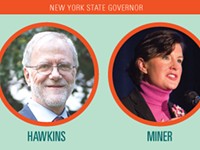
The New York governor's race: big choices, little attention
Oct 31, 2018 -
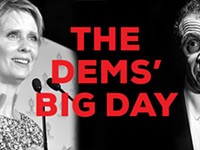
The Nixon-Cuomo race
Aug 29, 2018 - More »
Latest in News
More by Krestia DeGeorge
-
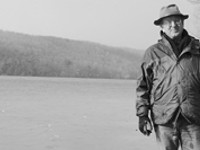
The last wild Finger Lakes
Jan 17, 2007 -

Designers get their turn at downtown
Jan 17, 2007 -
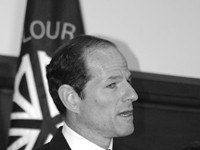
From the new governor: fighting words
Jan 10, 2007 - More »




